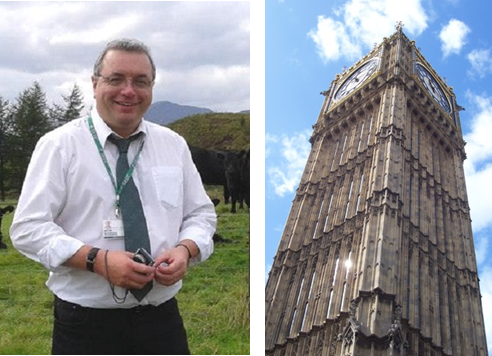Leaving the European Union could have major repercussions on a wide range of environmental and land use concerns within Scotland, and across the whole of the UK. Whilst some of these issues may seem complex, it is increasingly recognised that SEFARI contains a wealth of expertise which can contribute to such discussions. Of course our place is not to delve into the politics, but to use our research and expertise to provide an evidence-led platform for discussion.
To this end, I was recently invited to represent SEFARI at an event in the UK Parliament, organised by the Natural Environment Research Council (NERC) and the Parliamentary Office for Science & Technology (POST).
The meeting brought together a small number of recognised scientific experts to discuss such issues with the Houses of Commons and House of Lords committee’s subject advisers. Representatives from the Environmental Audit; Environment, Food & Rural Affairs; EU, Energy &Environment (Lords); European Scrutiny; Exiting the EU; Public Administration & Constitutional Affairs; Scottish Affairs; Welsh Affairs; and Women & Equalities committees were all present on the day, reflecting how integral environmental issues are to a wide range of parliamentary interests.
There are clearly a range of environmental concerns (such as addressing farmland biodiversity declines and tackling diffuse pollution at a catchment scale) which are common across the UK. But, my remit on the day was to highlight some of the additional environmental issues which were likely to be much a higher priority in Scotland, when compared to the rest of the UK.
I began by stressing that land managers have a huge role to play in helping to tackle environmental issues on behalf of wider society, and consequently it is essential that future mechanisms can appropriately support the different types of agriculture practised in Scotland. Leaving the European Union could present a real risk to the more vulnerable livestock systems in Scotland’s mountains and islands, especially those High Nature Value farming systems which cover over 40% of Scotland’s agricultural land and where the continuation of agricultural management is considered to be of high nature conservation importance. Any abandonment of farming in those areas could have a detrimental impact on the rural communities, habitats and wildlife species associated with them.
I also highlighted ambitious climate change targets as a major driver of Scotland’s environmental focus, with the Scottish Government proposing further ambitious revisions to our existing targets. Key targets include: obtaining 50% of heating, transport and electricity from renewable energy sources by 2030; to restore 250,000 ha of degraded peatlands by 2032; and a desire to markedly increase woodland cover in Scotland beyond the current 18% land cover. All these targets are aimed at reducing Scotland’s overall greenhouse gas emissions to 90% of 1990 levels by 2050 and (in recent revisions) to 56% of 1990 levels by 2020.
I was able to make the point that all these environmental issues cannot be seen in isolation from each other, and that actions to mitigate for one issue have the potential to be beneficial or have adverse impacts for other issues. That’s why there is a pressing need to understand the systems underpinning, and trade-offs associated with, any land management practice or land use change. This means landscape scale policies and practices must be designed and implemented accordingly.
The meeting was also attended by:
Sasha Leigh, Head of Policy Partnerships, who provided an overview of NERC’s new Environmental Evidence for the Future initiative which will seek to define, prioritise and address the medium- to long-term knowledge gaps in the environmental science evidence base post-Brexit;
Andy Jordan, working on political aspects of Brexit at the Tyndall Centre for Climate Change Research, who outlined a number of legislative and logistical challenges to dealing with environmental issues in the run-up to Brexit; and
Nick Wells, Centre of Ecology & Hydrology, who outlined the challenges and gaps in understanding associated with a range of cross-UK environmental issues, such as support for environmental management by farmers, achieving good ecological condition of waterbodies, addressing air pollution, ensuring biosecurity associated with plant and animal imports and maintaining and enhancing biodiversity in protected sites.
I have engaged quite a bit with MSPs in the Scottish Parliament in recent years and provided evidence a number of times to what is now the Environment, Climate Change & Land Reform Committee. It was very interesting to be able to highlight where the Scottish environmental perspective can be quite distinctive when viewed through a UK parliamentary lens. It was therefore very pleasing to see that SEFARI was able to bring something different to the discussions.
The meeting was a great opportunity for SEFARI, one we hope to build on as we contribute where we can to discussions around Leaving the European Union.
Davy McCracken Professor of Agricultural Ecology and Head of Hill & Mountain Research Centre Future Farming Systems
